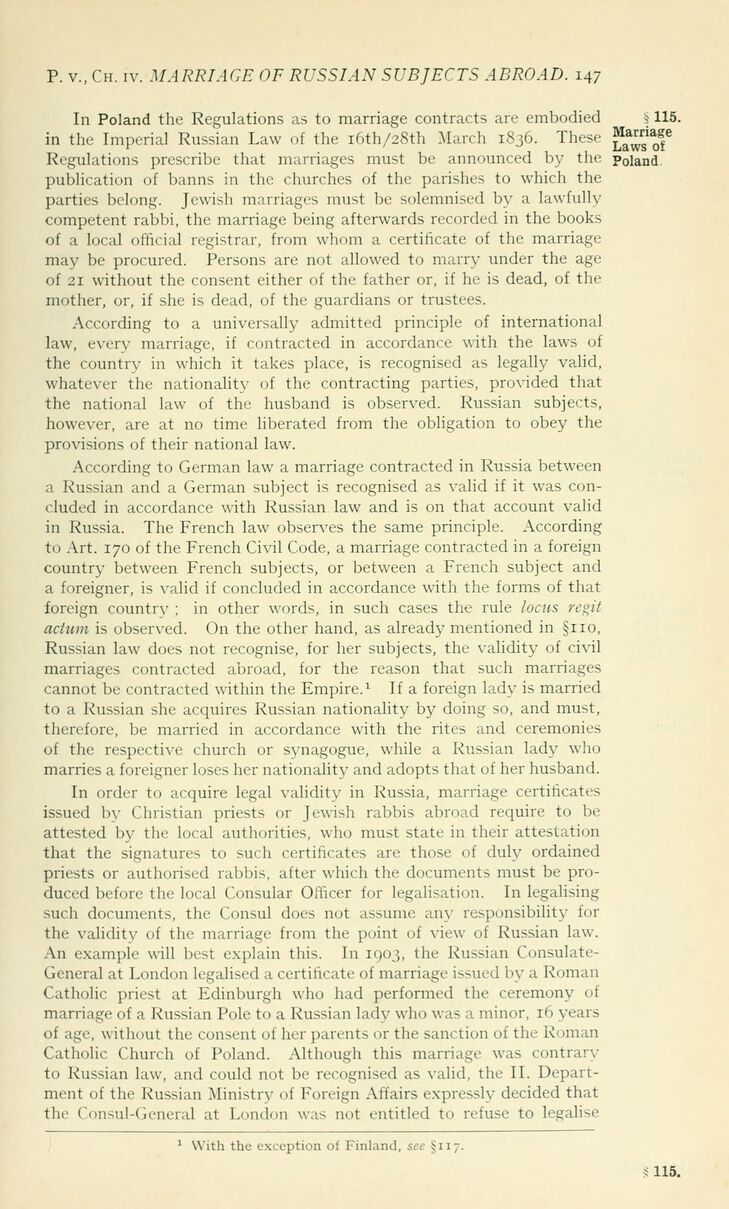
Full resolution (JPEG) - On this page / på denna sida - Pages ...

<< prev. page << föreg. sida << >> nästa sida >> next page >>
Below is the raw OCR text
from the above scanned image.
Do you see an error? Proofread the page now!
Här nedan syns maskintolkade texten från faksimilbilden ovan.
Ser du något fel? Korrekturläs sidan nu!
This page has never been proofread. / Denna sida har aldrig korrekturlästs.
P. v., Сн. IV. MARRIAGE OF RUSSIAN SUBJECTS ABROAD. 147
In Poland the Regulations as to marriage contracts are embodied
in the Imperial Russian Law of the i6th/28th March 1836. These
Regulations prescribe that marriages must be announced by the
publication of banns in the churches of the parishes to which the
parties belong. Jewish marriages must be solemnised by a lawfully
competent rabbi, the marriage being afterwards recorded in the books
of a local official registrar, from whom a certificate of the marriage
may be procured. Persons are not allowed to marry under the age
of 21 without the consent either of the father or, if he is dead, of the
mother, or, if she is dead, of the guardians or trustees.
According to a universally admitted principle of international
law, every marriage, if contracted in accordance with the laws of
the country in which it takes place, is recognised as legally valid,
whatever the nationality of the contracting parties, provided that
the national law of the husband is observed. Russian subjects,
however, are at no time liberated from the obligation to obey the
provisions of their national law.
According to German law a marriage contracted in Russia between
a Russian and a German subject is recognised as valid if it was
concluded in accordance with Russian law and is on that account valid
in Russia. The French law observes the same principle. According
to Art. 170 of the French Civil Code, a marriage contracted in a foreign
country between French subjects, or between a French subject and
a foreigner, is valid if concluded in accordance with the forms of that
foreign country ; in other words, in such cases the rule locus regit
actum is observed. On the other hand, as already mentioned in §110,
Russian law does not recognise, for her subjects, the validity of civil
marriages contracted abroad, for the reason that such marriages
cannot be contracted within the Empire.1 If a foreign lady is married
to a Russian she acquires Russian nationality by doing so, and must,
therefore, be married in accordance with the rites and ceremonies
of the respective church or synagogue, while a Russian lady who
marries a foreigner loses her nationality and adopts that of her husband.
In order to acquire legal validity in Russia, marriage certificates
issued by Christian priests or Jewish rabbis abroad require to be
attested by the local authorities, who must state in their attestation
that the signatures to such certificates are those of duly ordained
priests or authorised rabbis, after which the documents must be
produced before the local Consular Officer for legalisation. In legalising
such documents, the Consul does not assume any responsibility for
the validity of the marriage from the point of view of Russian law.
An example will best explain this. In 1903, the Russian
Consulate-General at London legalised a certificate of marriage issued by a Roman
Catholic priest at Edinburgh who had performed the ceremony of
marriage of a Russian Pole to a Russian lady who was a minor, 16 years
of age, without the consent of her parents or the sanction of the Roman
Catholic Church of Poland. Although this marriage was contrary
to Russian law, and could not be recognised as valid, the II.
Department of the Russian Ministry of Foreign Affairs expressly decided that
the Consul-General at London was not entitled to refuse to legalise
1 With the exception of Finland, see §117.
s 115.
§115.
Marriage
Laws of
Poland
<< prev. page << föreg. sida << >> nästa sida >> next page >>